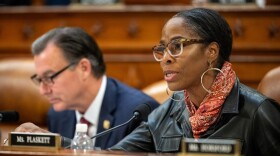WICHITA, Kan. — As the U.S. Department of Education undergoes major restructuring, the Virgin Islands Department of Education faces a new kind of uncertainty; not over how much funding it receives, but over how that money can be managed and sustained in the years ahead.
While local leaders insist that federal funding levels remain intact for now, shifting oversight structures, delayed approvals, and internal spending inefficiencies have created an unstable environment for a system that relies heavily on federal dollars to fund its classrooms, teachers, and special education services.
Local control amid federal shake-up:
Education Commissioner Dionne Wells-Hedrington confirmed that the department recently moved special education positions, including teachers and paraprofessionals, off federal grants and onto the local budget, calling the move “preemptive” to ensure that services for students with disabilities would continue even if federal grants were disrupted.
“There have been no cuts to federal funding,” Wells-Hedrington said. “We made a decision to move specifically teachers and paraprofessionals off the federal funds so that should there be any cuts moving forward, we would still have personnel to service our children.”
The decision came as staff in the federal Office of Special Education and Rehabilitative Services — with the exception of a handful of top officials and support staff — were notified earlier in October that they were being laid off, gutting the department responsible for handling nearly $15 billion in special education funding.
“The federal funding is still available,” Wells-Hedrington clarified.
The commissioner said oversight of grant compliance once handled on the federal level will shift back to local and state governments.
“The Trump administration is putting the compliance and oversight of the grants back at the state level,” Wells-Hedrington said. “In our case, the Office of Management and Budget will house that oversight unit.”
Chronic spending delays:
Even before these federal changes, VIDE has long struggled to spend the funds it receives on time, according to Senator Kurt Vialet. The department entered fiscal year 2025 with about $219 million in federal education funds but had spent only $126.5 million, leaving roughly $92 million unspent, according to a recent post-audit report.
Vialet, Committee on Education and Workforce Development chair, said that problem is both systemic and costly.
“The bigger concern to me isn’t how much we’re allocated, it’s our ability to spend the money once it’s allocated,” Vialet said. “We had $40 million in COVID relief funding that we had to send back just because we didn’t spend that money on time.”
Federal grants follow the Tydings Amendment, which allows territories up to two years to spend most awards. Once that window closes, unused money reverts to Washington D.C. About $9.5 million — mostly from the 2022 Consolidated Grant and 2023 Special Education and Adult Education funds — expired September 30.
However, Wells-Hedrington disputed recent figures.
“That is inaccurate,” she said. “We are still liquidating and finalizing those numbers with the third-party fiduciary.”
Bureaucracy bottlenecks:
Vialet said VIDE’s internal structure compounds the problem. Too many spending decisions, he argued, are made at the superintendent level rather than at individual schools, slowing down the process.
“All schools are different, so schools should be given more flexibility to spend the money once they fall within certain parameters,” Vialet, a former educator and school administrator, said. “Right now, everything happens from a superintendent level. I think they need to revisit the whole process.”
The 2022 Consolidated Grant had a budget of $17.1 million but left $1.8 million unspent, the 2023 grant left $6.4 million unspent, and the 2024 grant left $10.7 million unspent, according to post-audit data.
“We are working diligently to ensure that no funds are returned,” Shayla Solomon, VIDE director of Public Relations, said. “To enhance efficiency, we are implementing some internal restructuring. In the past, the department faced challenges when multiple grants expired simultaneously, compounded by vendor issues and contract delays.”
Critical federal lifelines:
Despite spending challenges, federal dollars remain the lifeblood of Virgin Islands public education. VIDE relies heavily on the Consolidated Grant and Perkins Grant, which fund programs ranging from after-school learning to career and technical education. Federal money also underwrites special education services and school lunch programs.
Since 2008, more than $152 million has supported special education, and $97 million has gone toward school meals. Over $138 million in American Rescue Plan Act funds was awarded to finance technology upgrades, learning-loss recovery, and safe school reopening after the coronavirus pandemic.
“Federal investments touch nearly every corner of education in the Virgin Islands, from early childhood programs to high school STEM initiatives that prepare students for 21st-century careers,” Kyza Callwood, Virgin Islands Board of Education chair, said.
When funding for science, technology, engineering and math initiatives and other programs is delayed or uncertain, Callwood said it puts such transformative initiatives at risk.
Academic gains, but uneven progress:
Despite incremental improvements in some areas, students in the Virgin Islands continue to perform well below national averages.
According to the territory’s 2022 Smarter Balanced assessments, only 6.1% of students met proficiency standards in math and 17.5% in English language arts, compared to national averages of about 39% and 31%, respectively, on the National Assessment of Educational Progress.
The 2025 USVI KIDS COUNT report, published by the St. Croix Foundation for Community Development, attributes much of this disparity to structural inequities and resource gaps, noting that “geography matters” when it comes to opportunity in the territory. The report highlights persistent challenges in early-childhood readiness, inconsistent data collection, and uneven school infrastructure that continue to hinder student achievement across the islands.
Looking ahead:
For now, VIDE leaders say the goal is to maintain stability while preparing for the unknown.
“We cannot sustain anything else on the local budget,” Wells-Hedrington said.
The challenge, they agree, isn’t just getting federal dollars; it's spending them effectively, on time, and with enough flexibility to meet schools’ real needs.
“Federal funding equips students not just with temporary resources but with the skills, confidence, and opportunities to navigate the vast ocean of knowledge for a lifetime,” Callwood said. “Our responsibility is to ensure those funds continue to flow and that they’re used wisely to unlock our students’ limitless potential.”
This piece was made possible by support from the International Center for Journalists’s News Corp Media Fellowship program.















